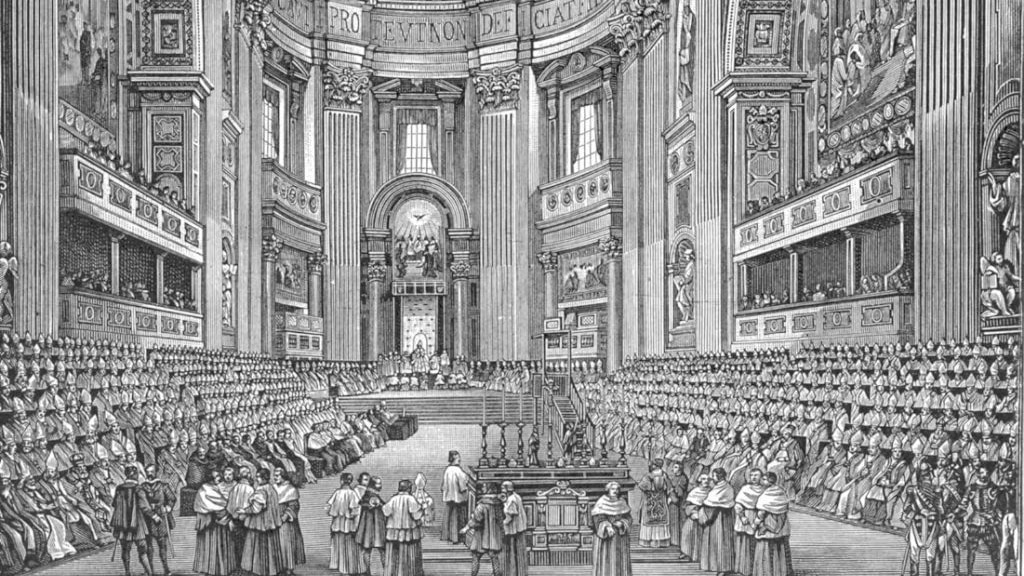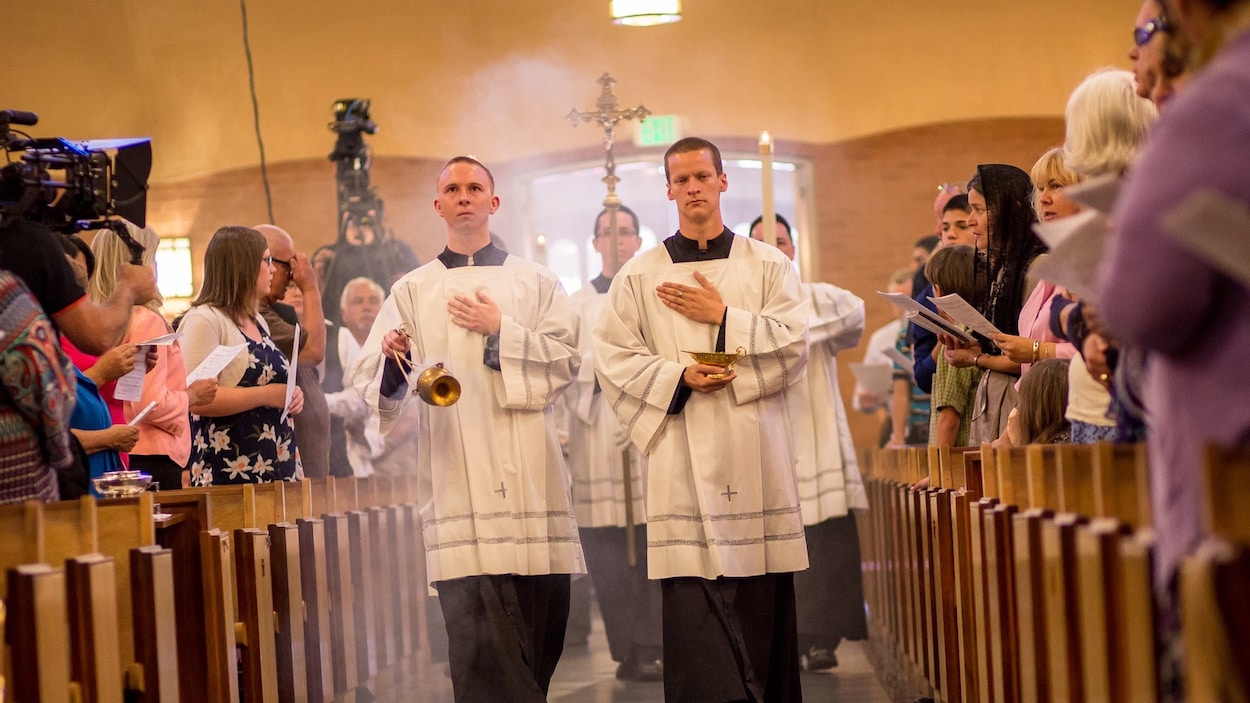Sadly, our world is more divided than ever before. Even a cursory glance at politics, education, or culture suffices to give one the impression that compromise is often no longer possible. The most essential principle to any civilization is the respect owing to every single human person, and even this principle is no longer a shared societal conviction. The U.S. House of Representatives refuses to support legal protections to save a baby born from a botched abortion. Abortion becomes infanticide, assisted suicide become involuntary euthanasia, and infertility becomes the pretext for experimenting on the human person and scientifically manipulating the origins of human life. Clearly, our civilization is at a breaking point: either we return to the core dignity of the human person made in the image and likeness of God or each of us will become disposable and subject to the power and utility of those who are stronger. Either right will make might, the rights of the human person will determine how people behave, or might will make right, the stronger will do as they please and justify themselves through an evolving ethic of choice and self-determination (Cf. Planned Parenthood of Southeastern Pennsylvania v. Casey, 505 U.S. 833, 851). There is no middle ground. The Church is clearly on the side of protecting human life from conception till natural death, and of protecting all the rights that stem from the fundamental right to life. Make no mistake, the right to life is the fundamental civil rights issue of our time. The rights to education, healthcare, food, water, and all other rights are derivative of the core right to life.
This being the general state of the human person in relation to society, we can then understand the reason for the polarization in our politics. But how is it that this polarization in the world is reflected, albeit in a more nuanced manner, in the Church herself? There should be no division between pro-life and social justice Catholics. Both the right to life and social justice rightly understood are expressions of the dignity of the human person created by God and capable of redemption in Christ. Protecting the unborn from abortion and feeding the poor are simply different dimensions of the same reality. The right to life is not the mere right to exist, but to live a dignified life in relation to society, which requires serving the poor. And social justice requires a human ecology of the conditions necessary for the human person to flourish, an ecology which is necessarily incompatible with abortion (Pope Emeritus Benedict XVI, Caritas in Veritate, 51). It is also the case that social justice does not presume that the government is the chief actor, and, in fact, the combination of solidarity and subsidiarity, two vital principles of Catholic social teaching, suggest that government social programs would be a case of last resort. Clearly, this division between life and social justice does not come from the teaching of the Church, nor the teaching of Christ, nor is it based in the truth; it is rather a microcosm of the polarization in society. Granting that those who identify more with the social justice issue in the Church do not generally disavow the necessity of being pro-life, nor do those who identity more with the pro-life issue generally disavow the necessity of social justice, it remains the case that the moral and political positions of those in the Church are reflective of the broader cultural debate about the proper role of the human person in relation to society.
What is missing in the Church is a consistent ethic of life that connects life, the natural family, concern for the marginalized, and justice for the poor? The Church needs to own this ethic of life rather than co-opting political talking points. Clearly, when the United States Conference of Catholic Bishops issues a statement on immigration, an issue that faithful Catholics can legitimately disagree about, but not on New York’s radical embrace of abortion, an issue that faithful Catholics cannot disagree about, we are lacking a consistent ethic of life and piecemeal responding to societal issues based upon one’s political predilections, rather than one’s evangelical convictions. How has this happened and how should we as the Body of Christ respond?
In short, the division in our Church mirrors the division in society because the Sacraments instituted by Jesus Christ have become disconnected from the moral life. Evangelization is about introducing people to the person of Jesus Christ who is Himself the Sacrament from which flow all seven Sacraments of the Church, His Bride. Catechesis is about connecting the Sacraments to the moral life, so that how we live is consistent with the gift of Himself Christ gives to us in the Sacraments. The link between Christ and the moral life, between the Sacraments and the moral life has been severely weakened. By restoring this vital link between the Sacraments and the moral life, the Church can own an ethic of life that forms our culture and overcome the polarization that characterizes the broader culture.
Connecting the Sacraments to the Moral Life: A Catechetical Model
What follows is a sincere attempt to connect the Sacraments to the moral life. This is not comprehensive nor definitive, as there are many ways this can be done. Nevertheless, this is a good rubric for focusing catechesis on the essential connection between the Sacraments and the moral life.
Let us begin with the Sacraments of Initiation: Baptism, First Holy Communion, and Confirmation. Then we will proceed to the Sacraments of Vocation: Marriage and Holy Orders. Then to the Sacraments of Healing: Reconciliation and Anointing of the Sick.
Baptism
The Sacrament of Baptism “brings about the birth of water and the Spirit without which no one ‘can enter the kingdom of God’” (Catechism of the Catholic Church, 1215). According to St. Paul, Baptism makes us sharers in the death of Christ and in His Resurrection (Romans 6:3-4). The passage of Christ from death to life is thus replicated in the soul of the baptized. This passage from death to life is not limited to the soul, but also extends to the body (Romans 8:10-11). Furthermore, this passage from death to life is pure grace, totally unmerited, given to the baptized because of the mercy and love of God. Without this life-giving gift of the Holy Spirit conferred in Baptism, salvation is generally not possible (St. John 3:5).
From this brief theological explication of Baptism, there are several applications to the moral life. Firstly, the trajectory of Baptism is from death to life. We were dead in our sins, and by passing through the death of Christ, we rise to eternal life by being enabled to share in the Divine life, the communion of love between the Father, the Son, and the Holy Spirit. How then can a person who has gone from death to life, and without any merit on his or her part, support the death of the unborn or anyone, effectively taking them from life to death? For a person who understands the essence of Baptism, the transition from life to death is at odds with the gift they have received. Such a person understands that God is the God of life, that life is a gift from God, and that having received life from God in Baptism, we must ensure the conditions necessary for human life to flourish, the chief of which is the basic protection of the right to live until natural death. For a Baptized person to advocate for abortion or euthanasia is either proof of mental disorder, or ignorance of the gift they received from Christ. Baptism is the Sacrament of life which should empower us to protect the lives of others.
Baptism also reorients our understanding of the poor. We see that the truly poor are not those without food and shelter, but those without the light, life, and love of God dwelling in their soul, those who have not received the Sacramental gift of the Holy Spirit in Baptism. For the one who is baptized, it is essential to feed the poor, clothe the naked, and visit the lonely, but these actions are a participation in a greater work of mercy, which is the introduction of a person to the source of all life, Jesus Christ. By serving the marginalized and poor, they are bringing Christ to others, and that gift of Christ is the gift of life.
The life-giving waters of Baptism thus give birth to protections for human life in the womb and alms for the poor on the street. These fruits are derivative of the Sacramental gift of the Holy Spirit in Baptism and only require that those who are baptized understand the true nature of the grace they are receiving.
Holy Communion (receiving the Eucharist)
By this sacrament, we are united to Christ through receiving His precious Body and Blood, Soul and Divinity (CCC, 1331). The principal fruit of this Sacrament is intimate union with Christ (CCC 1391). Our Lord says this clearly by saying that we abide in Him through receiving Him (St. John 6:56). What we receive is life itself, for Christ whom we receive is Himself, the Way, and the Truth, and the Life (St. John 14:6). Further, “what material food produces in our bodily life, Holy Communion wonderfully achieves in our spiritual life (CCC 1392). The life of Christ’s Spirit communicated in Baptism is preserved, increased, and renewed (CCC 1392).
How then can a person who has received the Bread of Angels be insensitive to the hungry and homeless? Surely, the urgency to feed the hungry, and provide shelter for the homeless is magnified by the fact that we ourselves are hungry and Christ feeds us with Himself, we ourselves are in need of shelter and Christ give us an inheritance in heaven by uniting us to Him. Furthermore, the love of Christ which lives in the hearts of those who receive Communion can never be satisfied so long as people go hungry and suffer cold from lack of shelter. Nor can the person who receives our Lord, who abides in the source of all life, consent in good conscience to the destruction of those whom Christ passionately desires to give Himself to as food and drink. Surely, to feed upon Christ and then fail to protect others whom Christ desires to feed with His very Body and Blood, whom we are called to communion with as co-heirs of the Body of Christ, is a monstrous absurdity. In the Eucharist, the imperatives to feed the hungry and protect the most vulnerable are inextricably intertwined. Social justice and pro-life are common fruits of union in Christ, a union which is especially present in Holy Communion.
Confirmation
The best explanation of the Sacrament of Confirmation, which completes the Sacraments of Initiation is the following: “Confirmation perfects Baptismal grace; it is the sacrament which gives the Holy Spirit in order to root us more deeply in the divine filiation, incorporate us more firmly in Christ, strengthen our bond with the Church, associate us more closely with her mission, and help us bear witness to the Christian faith in words accompanied by deeds” (CCC 1316). Confirmation is then the Sacrament of witness because it provides the grace to publicly witness to Christ.
Given this understanding, a person who understands their own Confirmation cannot remain silent when unborn babies, who bear the image of God and are also called to receive the same Holy Spirit, are being slaughtered through abortion. Even less is it conceivable that such a person can actively support policies which compromise the lives of the unborn. A laity that understands the gift of the Holy Spirit they have received will not tolerate their elected leaders supporting policies that disenfranchise the unborn from the human family. Nor is it conceivable that Bishops in the Church who have the responsibility to administer the Sacrament of Confirmation will, if they truly understand the Sacrament they administer, allow allegedly Catholic institutions to bestow honorary degrees on pro-abortion politicians. The failure to witness to the truth of human dignity is understandable given human weakness, but that is why we have Confirmation which empowers our courageous witness to the truth.
Nor can a person who understands their Confirmation give in to a practical materialism that prizes material possessions and wealth as life’s greatest treasures. Such a person will look upon their poor neighbor with an understanding that they must witness to the presence of Christ, which often means sharing wealth. Such a person cannot in good conscience fail to act to serve the poor when they are presented with the scandal that some live in opulence and others live in sub-human conditions.
In truth, the courage to witness bestowed by the Sacrament of Confirmation empowers both witness to life and witness to social justice because both are manifestations of witness to the person and mission of Jesus Christ.
The Sacrament of Marriage
Theologically, the Sacrament of Marriage is indissoluble and it is a reflection of the enduring and eternal union between Christ and the Church (CCC 1614). Christ gives the grace to the husband and wife to persevere in their fidelity to each other (CCC 1615). Through the Sacrament of Marriage, God’s love is manifested to the world through the love between the husband and the wife. This sanctified union prepares a fit environment for children to be raised and learn about the love of God through the love of their parents for each other. Children are thus immersed in a practical experience of God’s love from the moment they are conceived.
Now a married person who understands the Sacrament they have received will be desirous of protecting both children, the natural fruit of Marriage, and Marriage itself, the fount of God’s love in the world. How can a person who knows the meaning of their marriage and the protection afforded to their children from that marriage not speak out when other children’s lives are snuffed out through abortion? What person who has received the twin gifts of Marriage and children can possibly desire for these two goods which God has joined to be disconnected through contraception and assisted reproduction? Who that understands the true meaning of Marriage for children and society will remain silent when courts of law fabricate an erroneous union and invest it with the same rights and duties that pertain to natural marriage? Such a person would implicitly understand that children will only be harmed when they are deprived of a loving father and mother whose love for each other models the love of the Father for the Son, and the Son for the Father? In truth, the Sacrament of Marriage provides grace to witness to the beauty, truth, and goodness of Marriage and the fruit of Marriage, children.
Similarly, one who understands the Sacrament of Marriage they have received will take care of the orphan and the widow. How could they not, considering that the widow is deprived of the precious love of his/her spouse and the orphan is deprived of the love from which he or she came into the world? Such a person will, when not blessed with natural children through their Marriage, remain open to adopting other children and giving them the love they should have always had.
As was the case with Baptism, Holy Communion, and Confirmation, Holy Matrimony allows mean and women to live authentic lives of witness to Jesus Christ, lives which are characterized by an internal consistency that applies to all of life, whether it be justice for the poor or protecting the most vulnerable children.
Holy Orders
“The grace of the Holy Spirit proper to this [S]acrament is configuration to Christ as Priest, Teacher, and Pastor” (CCC 1585). There are three degrees of this Sacrament: bishops, priests, and deacons. Those who are ordained receive an indelible character upon their soul that can never be erased (CCC 1597). Ordained ministers teach the people of God, lead divine worship, and govern the people of God.
Surely a deacon, priest, or bishop who has received Holy Orders will teach consistent with the doctrines of the Church, particularly when it is a question of grave sin such as abortion. Surely a deacon, priest, or bishop would teach the importance of poverty and detaching our hearts from the love of visible things? After all, they have been empowered to teach and their governance of the Church requires that their flock be properly disposed to the world. Loving correction of those who error and especially of those who cause scandal to others cannot be forsaken without forsaking an essential function of Ordination. Like Marriage, Holy Orders contains within itself an antidote to the segmenting of Christian life.
Reconciliation
Reconciliation (also known as Penance or Confession) is the Sacrament through which the Baptized are reconciled with God and with the Church (CCC 980). The penitent confesses their sins to a Priest who acts “in persona Christi,” in the person of Christ. It is Christ who forgives the penitent. The Sacrament provides for the remission of the eternal punishment owing to mortal sin, as well as “an increase of spiritual strength for the Christian battle” (CCC 1496). The Sacrament helps the Baptized to overcome all sin, mortal and venial.
Since then those who receive Reconciliation are reconciled to God and the Church, they are duty bound to reconcile the world with God. It is unthinkable that a person who has understood their reconciliation with God affected through the Sacrament of Reconciliation would work to alienate the world from God by supporting the killing of His innocent children, or by failing to assist those at the margins of society who need to be reintegrated in the human family? Again, we see that the logic of the Sacrament of Reconciliation promotes the wholistic living of the Gospel.
Anointing of the Sick
In this Sacrament, the priest lays hands on one who is sick and anoints them with oil blessed by a bishop. “The first grace of the [S]acrament is one of strengthening, peace, and courage to overcome the difficulties that go with the condition of serious illness or the frailty of old age” (CCC 1520). The sick person is by virtue of this Sacrament united to Christ’s passion (CCC 1521), so that his suffering acquires a particular redemptive meaning. The person who receives the Anointing of the Sick “contributes to the sanctification of the Church” (1522). As the Sacrament given prior to death, the “Anointing of the Sick completes our conformity to the death and Resurrection of Christ, just as Baptism began it” (CCC 1523).
How then can one who has been empowered to suffer for the Lord and for the good of the whole Church remain silent when others choose to end their life to avoid the same suffering that Christ uses to redeem the world in the Sacrament of Anointing of the Sick? How can one who has been strengthened in this Sacrament fail to have compassion on those who are sick and in need of compassion? As with all the other Sacraments, the Anointing of the Sick contains within itself the seeds of an authentic, Christian life.
Conclusion
This catechetical model demonstrates that Christ has already given us the solution to polarization within the Church. The division in the world has entered the Church because we fail to live the Sacramental life authentically. Only through living from the Sacraments and teaching others to do the same will the Church overcome the polarization that weakens our witness to the love of Jesus Christ.








